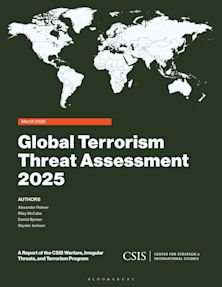- Home
- ACADEMIC
- Politics & International Relations
- Security and Strategic Studies
- The Geopolitics of Security in the Americas
The Geopolitics of Security in the Americas
Hemispheric Denial from Monroe to Clinton
The Geopolitics of Security in the Americas
Hemispheric Denial from Monroe to Clinton
You must sign in to add this item to your wishlist. Please sign in or create an account
Description
Sicker examines the role of the United States within the Western Hemisphere and the geopolitical and geostrategic factors that have helped shape its policies in the region. He demonstrates that such factors have contributed heavily to establishing the patterns of state development and interstate relations in the Western Hemisphere throughout its modern history. The prevailing geopolitical environment has been conditioned to a large extent by the emergence of the United States as the unquestionably dominant power in the extensive region. However, that status did not exist at the time it achieved its independence. It was brought about through almost incessant conflict with, and expansion at the expense of, other states, nations, and peoples over more than a century. As a result, the concerns and interests of the dominant power became and remain, of necessity, factors that states beyond the borders of the United States must take into consideration when pursuing their own national interests and policies. As Sicker amply demonstrates, failure to do so will often produce undesirable consequences for the offending state.
As is clear, however, the states of the hemisphere have their own geopolitical interests and concerns independent of, and sometimes conflicting with, those of the United States. As Sicker shows throughout the volume, and especially in his analysis of inter-American conflicts, many of the nations of Latin America have unresolved territorial controversies with their neighbors that date to their origins as independent states. Because of this troubled geopolitical legacy, there have been numerous conflicts among the states of Latin America, some of which the United States has attempted to mediate or arbitrate, and some that seem impervious to a permanent negotiated settlement. This is a provocative analysis that will be of interest to scholars, students, researchers, and policymakers involved with inter-American relations and U.S. diplomacy.
Table of Contents
The Doctrine of Hemispheric Denial
Applying the Monroe Doctrine, 1833-1870
Unilateralism Unleashed, 1877-1941
U.S.-Mexican Relations, 1910-1940
The Doctrine of Nonintervention and Collective Security, 1923-1945
The Rio Treaty and the Organization of American States, 1945-1965
U.S. Intervention, 1970-1992
Inter-American Conflicts
On the Threshhold of the 21st Century
Bibliography
Index
Product details
| Published | 30 Nov 2001 |
|---|---|
| Format | Ebook (PDF) |
| Edition | 1st |
| Extent | 200 |
| ISBN | 9780313075766 |
| Imprint | Praeger |
| Publisher | Bloomsbury Publishing |
About the contributors

ONLINE RESOURCES
Bloomsbury Collections
This book is available on Bloomsbury Collections where your library has access.



































